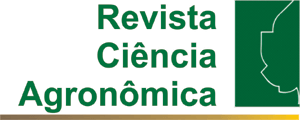ABSTRACT
Using energy balance methodology, this study compared the sustainability of ethanol synthesis from sugarcane irrigated with different replacement levels based on the evaporation estimated in a Class A pan (ECA), using treated domestic sewage effluent and groundwater as the water source, in Aquiraz, in the State of Ceará. The adopted statistical design was of randomised blocks in split plots, with four replications. Two water sources (treated sewage effluent and groundwater) were evaluated in the plots, and five irrigation levels (50, 75, 100, 125 and 150% of the ECA) were evaluated in the split plots. Irrigation with treated domestic sewage effluent results in greater energy expenditure. The irrigation depth relative to 150% of the ECA expends the most energy, irrespective of the water source. Irrigation with treated domestic sewage effluent gives a higher energy yield (368.9 GJ ha-1) through the application of a depth of 781.4 mm, while for irrigation with groundwater, 937.6 mm (150% of the ECA) is the best recommended depth for obtaining the highest energy yield (276.9 GJ ha-1). Domestic sewage effluent gives the best energy return, and its use in systems of crop-production is viable.
Key words:
Reuse of water; Energy balance; Saccharum officinarum L.

